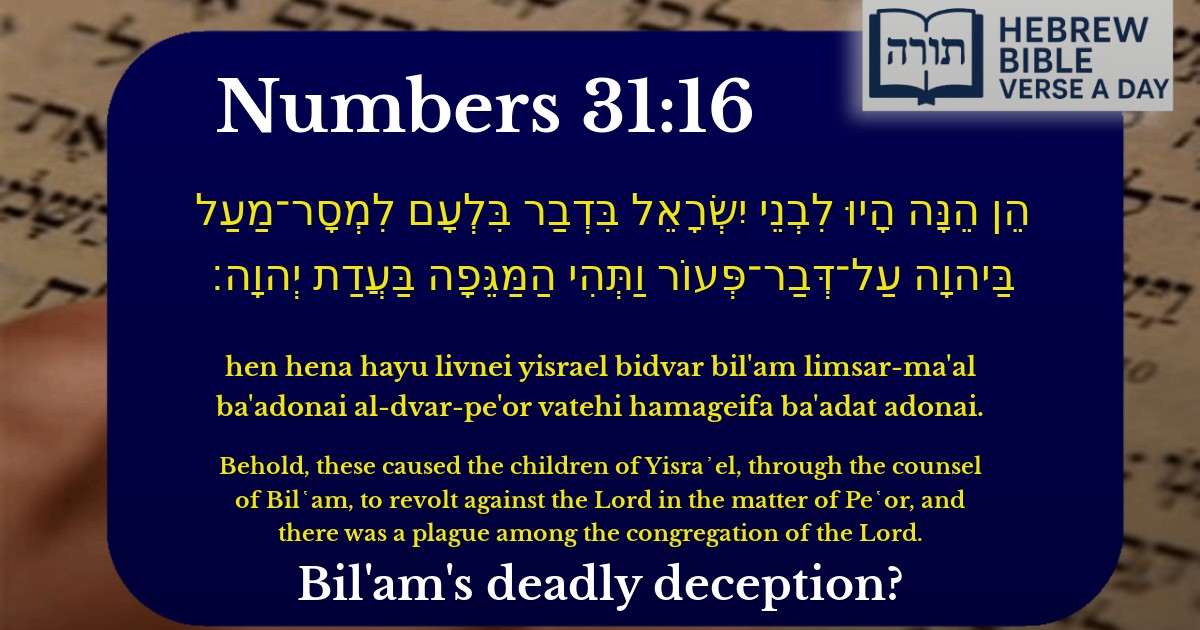Join Our Newsletter To Be Informed When New Videos Are Posted
Join the thousands of fellow Studends who rely on our videos to learn how to read the bible in Hebrew for free!
Hebrew Text
הֵן הֵנָּה הָיוּ לִבְנֵי יִשְׂרָאֵל בִּדְבַר בִּלְעָם לִמְסָר־מַעַל בַּיהוָה עַל־דְּבַר־פְּעוֹר וַתְּהִי הַמַּגֵּפָה בַּעֲדַת יְהוָה׃
English Translation
Behold, these caused the children of Yisra᾽el, through the counsel of Bil῾am, to revolt against the Lord in the matter of Pe῾or, and there was a plague among the congregation of the Lord.
Transliteration
Hen hena hayu livnei yisrael bidvar bil'am limsar-ma'al ba'adonai al-dvar-pe'or vatehi hamageifa ba'adat adonai.
Hebrew Leining Text
הֵ֣ן הֵ֜נָּה הָי֨וּ לִבְנֵ֤י יִשְׂרָאֵל֙ בִּדְבַ֣ר בִּלְעָ֔ם לִמְסׇר־מַ֥עַל בַּיהֹוָ֖ה עַל־דְּבַר־פְּע֑וֹר וַתְּהִ֥י הַמַּגֵּפָ֖ה בַּעֲדַ֥ת יְהֹוָֽה׃
Parasha Commentary
📚 Talmud Citations
This verse is quoted in the Talmud.
📖 Sanhedrin 106a
The verse is referenced in the discussion about Balaam's (Bil'am) role in leading the Israelites to sin with the daughters of Moab, which resulted in the plague.
📖 Sotah 43a
The verse is alluded to in the context of discussing the consequences of the Israelites' actions under Balaam's influence.


Context of the Verse
This verse (Bamidbar 31:16) recounts the incident where Bilaam advised the Midianites to lead Bnei Yisrael astray through immorality and idolatry with the daughters of Moav at Peor. The plague that followed was a direct consequence of this sin, resulting in the deaths of 24,000 Jews (as recorded in Bamidbar 25:9). The verse emphasizes the severity of the transgression and its tragic outcome.
Rashi's Explanation
Rashi (on Bamidbar 31:16) explains that Bilaam, unable to curse Bnei Yisrael directly, advised Balak to entice them into sin. He understood that Hashem's protection over Israel was contingent on their moral and spiritual fidelity. By causing them to sin, he effectively removed that protection, leading to the plague. Rashi notes that this strategy was rooted in Bilaam's knowledge of Hashem's ways—that sin would provoke divine wrath.
The Role of Peor
The sin of Peor (Avodah Zarah linked with immoral acts) was particularly grievous. The Talmud (Sanhedrin 106a) states that Bilaam advised the Midianites to set up tents with women selling wares, luring Jewish men into sin. The Midrash (Bamidbar Rabbah 20:23) elaborates that this was a deliberate trap to undermine Bnei Yisrael's covenant with Hashem.
Rambam's Perspective
Rambam (Hilchot Avodat Kochavim 1:2) discusses the severity of idolatry, noting that Peor was among the most debased forms, involving public indecency. The plague was a measure-for-measure response to the moral collapse brought on by Bilaam's counsel.
Lessons from the Incident
Midrashic Insights
The Midrash Tanchuma (Balak 18) states that Bilaam's advice was rooted in his hatred for Israel, despite his inability to curse them. This underscores the danger of external enemies who seek to harm Klal Yisrael spiritually when physical harm is impossible.